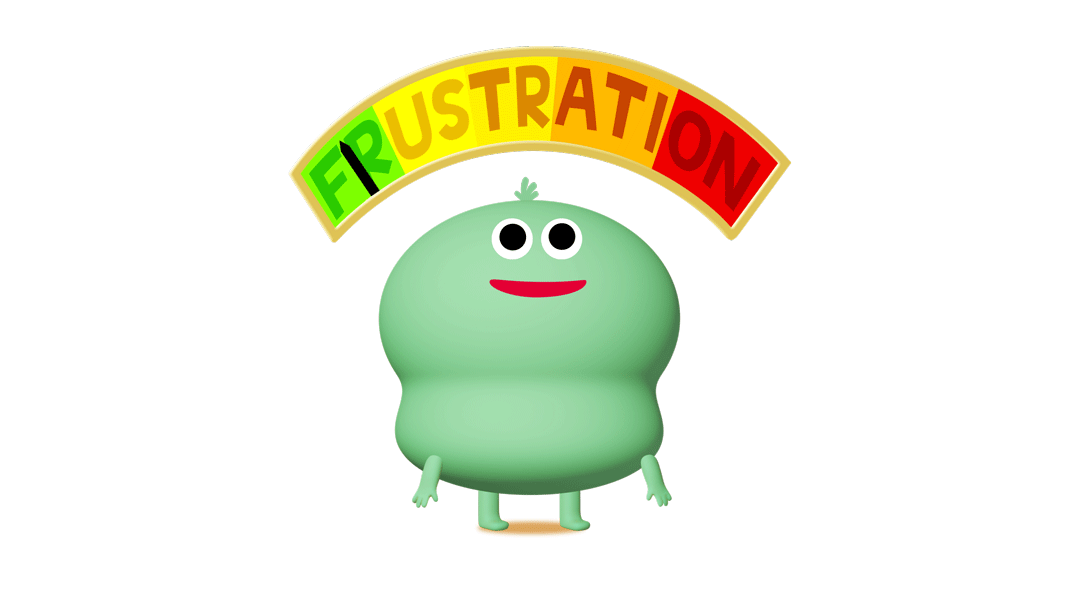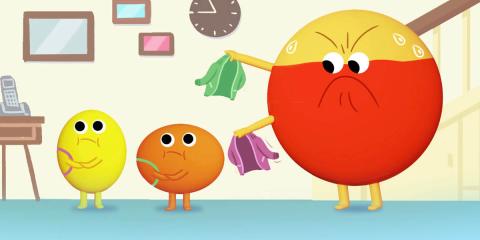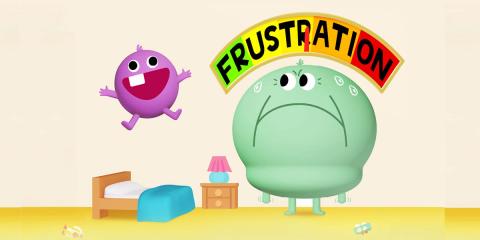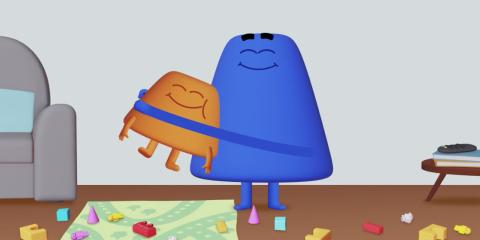All you want is for your little one to be happy, so it can be hard to see them get upset or cross. Not to mention exhausting for you both! We can’t promise that we have all the answers, but we do have some good ideas for how to manage tantrums.
Stopping a tantrum before it starts
Tip #1: Be realistic
There are certain practical things you can do to avoid trouble. For example, you can’t expect a toddler to know that the ornament you left within arm’s reach isn’t a toy to bang on the floor. Or that the lovely toy you’ve just bought is for their cousin, not for them. Try to think ahead to avoid these kind of incidents, and put things you don’t want them to touch out of temptation’s way.
Tip #2: Learn how to spot the warning signs
Spotting the early warning signs of a tantrum is the key to stopping it spiralling out of control. It's easy to feel helpless when your child has a tantrum, but you might start to notice the same things are causing them every time. Maybe they’re too hot or too cold, they’re hungry, or just really tired. If you can work out what caused it, then maybe you can avoid these triggers in the future, for example, by dressing them in layers, carrying healthy snacks with you when you’re out and about and letting them have a longer nap.
Tip #3: Out and about

You may also notice that certain situations tend to cause an outburst, like supermarket checkouts and crowded buses. So while you can’t swerve these situations altogether, try to avoid combining them with other triggers, like tiredness or hunger.
Sometimes simple things like pointing out what you can see on the bus or in the shops could help lead to fewer tantrums. It helps keep them entertained – and they love getting your attention.
Tip #4: Prepare them for disappointment
It may help avoid tantrums if you let your child know in advance what will be happening. For example, if you’re walking past the playpark but don’t have time to play on the swings, let your child know this before you get there, so they don’t get excited about the thought of playing and are then disappointed.
Tip #5: Give them a choice
If they’re about to throw a strop, giving them a choice can help stop tension building. You could allow them to make certain decisions, such as whether to wear the red top or the blue one, or whether to brush their teeth before or after their bath. If they make choices from options you give them they feel they have some input, without you losing your authority.
Tip #6: Give them your attention
Sometimes they just want some of your attention. They could be jealous if you’re on your phone, or talking to your friends or another child. If you notice this is happening, lift them onto your knee for cuddles.
Tip #7: Give them a countdown
If you know that certain situations often provoke a tantrum – like turning off their devices or going to bed – try giving them a countdown. This gives them time to finish what they’re doing, and it’ll come as less of a shock when they have to stop. You can find more tips for unsticking them from their screens here.
Tips for distracting them
If you see them gearing up for a tantrum that you really don’t have time to deal with, you can always try distracting them. It can be tempting to hand them your phone to do this, but try not to rely on this too much. Research shows that if we use phones to distract our children too frequently, this may even prevent them from developing ways of coping with anger, frustration and other strong emotions. Instead, try singing a funny song, suggesting they help to look for a toy or taking them to another room – anything that shifts their attention.
Here are some easy ways to distract them that also have benefits for their development. But remember, it’s still a good idea to try and get to the bottom of what was upsetting them.
Tip #1: Black holes
There will be times when they just won't want to tidy up. So make it a bit more fun for them. You could try pretending their toy box is a black hole and all the toys are getting sucked into it. Make the noises as everything flies across the room into the box. And maybe rescue your little one at the end - black holes can be very powerful!
Your child’s development: Doing chores has been shown to set kids up to do well even they're well into adulthood! Make it into a game and do it together.
Tip #2: Why thank you!
If they’re getting grumpy, try passing toys back and forth between the two of you, saying please and thank you each time.
Your child’s development: Games where you go back and forth are good for learning manners.
Tip #3: Use funny hand gestures
If your wee one is after your attention, try chatting to them using hand gestures to accompany the words. You could even do it in funny voices.
Your child’s development: Hand gestures help your child figure out what words mean. These all help them build their personal vocabulary.
Tip #4: Distract them first
If you sense it's all about to kick off, find something to distract them and nip it in the bud. It could be something you can see out of the window. ‘Look! A cat!’ Try to sound as interested as you can. The surprise and sudden change in conversation can help distract them. Then you can turn it into a game: ‘what can you see?’
Your child’s development: Toddlers have shorter attention spans so they can be distracted easily. Take advantage of it while you can!
Tip #5: Shopping lists
Before going out shopping, draw some of your child's favourite items (or cut out of magazines) and let them give them responsibility for the ‘shopping list’. You can find more tips for going shopping with your toddler here.
Your child's development: As children get older, they want to be more independent and to be in control of things. That can often mean more tantrums. Use it to your advantage by giving them little things they can be in charge of. This tip will also help your fussy eaters eat up!
Tip #6: Calm down with storytime

Cuddle up and read a book together. It's a quick and easy way to distract them from whatever is irritating them, and you can give them lots of positive attention while you're at it.
Your child's development: Books are a great way to help your child learn about themselves, their world, and even their emotions. What do they think the character in the book is feeling? What happens when they feel sad/happy/grumpy?
Stories really help them with their language – you'll often find that as their words grow, and they can say more about what’s bothering them, their tantrums will start to die down.
Stopping a tantrum while it’s happening
No matter how hard you try, your toddler probably will still throw the odd tantrum or refuse point blank to do something – probably at the most inconvenient moment!
Try to rise above it, if you can, and keep calm. Talking to kids and soothing them when they're upset helps them learn how to manage their own emotions. Studies show that shouting doesn't make kids’ behaviour better. In fact it can make them grow up to be more anxious and aggressive. So best to avoid it when you can.
And remember, this phase won’t last forever. Here are some tips to help you keep your cool and feel in control.
Tip #1: Keep your cool
It’s really hard when we see our kids getting upset, but take a deep breath and remember you are in control. As long as they’re safe, it’s okay to need a minute to calm yourself down before you try to calm them down.
Our page on coping with being a parent has more tips on keeping your dool and dealing with difficult behaviour in a calm, helpful way.
Tip #2: Try to ignore it
Another popular tip is just not to give any attention to your child when they’re losing their temper. Getting cross or shouting back won't help. As long as they’re safe you can always try to look away and wait for them to calm down themselves. Or you could try chatting to them in a calm voice until they settle – this means they are getting the attention they want but you aren’t giving in to their demands to get chocolate at the checkout/not eat their broccoli/wear shorts when it’s snowing or whatever else they’re after.
Tip #3: Help them work out what's wrong
Try to keep as calm as you can and help them work out what’s wrong. Sometimes the behaviour is your child’s way of telling you that they feel frustrated or lonely or need some peace and quiet. They might be tired or hungry. Or feeling frustrated or jealous. Talking to them will help you discover the cause and what you need to do to get everything back to normal.
If you’ve been practising colouring in your emotions (with red for angry, blue for sad, green for jealousy and so on) now is a good time to ask ‘are you feeling red/blue/green?’ to help them express how they feel.
Tip #4: Try whispering
Remember those teachers who always got the class to quiet down because they stayed calm when everyone was getting rowdy? This trick is just like that. If you whisper, they often quieten down to match you.
Tip #5: Kindness trumps logic
Sometimes your child may have a tantrum over something that seems completely ridiculous to you, but to them it’s really important – like having a sandwich cut into squares instead of triangles. Chances are if they’re all worked up and upset they won’t listen to logic. So rather than attempting to reason with them, try being understanding instead: ‘I know you like triangles, but squares are fun too – why don’t you try a tiny little bite and see if you like it?’ And, ‘What fun things can we think of that are square?’
Tip #6: Mirror mirror

When they're screwing their faces up, try to mirror their expressions but in an understanding way, following it up with a smile. Saying ‘I know how you feel’, or ‘I hear what you're saying’ when they're having a moan helps them feel understood a bit better.
Tip #7: Focus on solutions
Seeing tantrums, toilet training, sleep and mealtimes as problems can make them seem impossible to solve. But by focusing on finding answers you can feel confident and more in control. The same goes for your child. So helping them to put things right if they’ve misbehaved will help them feel more in control too. For instance, if they’ve thrown things on the floor you could suggest they help you clear up, or if they’ve been mean to a sibling or friend you could ask them to apologise.
Tip #8: Emphasise the positives
Once the annoying behaviour or temper tantrum is over, try to find something positive to notice about what your child is doing and praise them for it. Positive reinforcement is really important in dealing with their behaviour.
Tip #9: Don't give in
Sometimes it can be so tempting just to give in and let them have what they want so they’ll stop screaming. But if they learn that throwing a tantrum will get them what they want, they’ll never stop! Instead, try to keep calm and soothe them with soft words and cuddles until it blows over.
Coping with tantrums in public
We’ve all been there – you’re in the supermarket and your child decides they want an expensive sugary treat then chucks a massive strop when you tell them they can’t have it. Or you’re struggling onto the bus and your wee one decides they’re not going to get on. When your toddler has a tantrum in public, it can feel as if everyone is staring and disapproving.
But try not to let it get to you – most of the people around you have probably been in your exact same position at some point and are very sympathetic. Remember, tantrums are a normal part of a child’s development – all kids have them. By keeping calm and soothing them, you’ll help it blow over quickly.
Getting support
The ‘terrible twos’ can be tough. Think about what support might help you at this time. Some parents feel that talking to other parents with children of a similar age can be reassuring. While they might not have any answers, just talking things through can be really helpful. A parent and toddler group can be a great place to meet other parents to chat with.
Remember you can also talk to your health visitor or family nurse about your child’s behaviour and how you can deal with it. You could also phone or chat online to Children First's support line for advice and support.

Free Togetherness Online Learning Pathways courses for parents and carers
Life as a parent can be busy! Are you looking for help to understand your child and how you can support them as a parent, but not sure where to start? If so, you might be interested in looking at the Togetherness Online Learning Pathways. The Pathways cover a range of topics and ages from pregnancy to 19+ years. Togetherness online learning pathways take parents on a learning journey to increase understanding about childhood development, behaviour and wellbeing. This helps build connected relationships, resilience and supports families to thrive.
You can find out more at Togetherness and access the courses for free using the code TARTAN.
What the professionals say
“There is no such thing as a perfect parent. That is such a relief for parents to hear! In fact, our children don’t even need perfect parents. Young children learn a lot from moments of difficulty, including when they are unhappy with you! The most important thing about those tough moments is that you ‘make up’ at the end of them. You let your little one know that you heard their discomfort. Scientists call this the ‘Rupture-Repair Cycle’. Ruptures are okay as long as there is always a repair afterward. Trust is built in those moments of repair.”
“A crying baby or a toddler with a tantrum is not a spoilt child. It is someone with feelings too strong to manage themselves. If we help them solve their problem, they will gradually become more able to solve it themselves.”
Being a parent is the best job in the world, but it can also be one of the most stressful. There will be days when it all feels a little too much. To help you manage the challenges ahead, Parent Club has some tips on coping with being a parent and keeping calm with your wee one so you can build a rewarding relationship together.

 Activities & Play
Activities & Play Behaviour
Behaviour Childcare
Childcare Development & Growing Up
Development & Growing Up Family, Friends & Relationships
Family, Friends & Relationships Feeding Your Baby
Feeding Your Baby Food & Eating
Food & Eating Health & Safety
Health & Safety Mental Health & Wellbeing
Mental Health & Wellbeing Money & Work
Money & Work Online Behaviour & Safety
Online Behaviour & Safety Pregnancy & First Days
Pregnancy & First Days School & Education
School & Education Sleep
Sleep









 Family, Friends & Relationships
Family, Friends & Relationships
 Mental Health & Wellbeing
Mental Health & Wellbeing